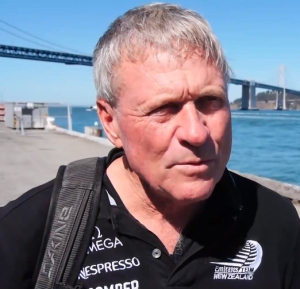Rod Davis is a genius.
How do I know? Because his writing stands the test of time. And these days, that’s a dying art.
Most online stories are published and forgotten within a week, though they can be tracked down (and updated) as far into the future as the Internet is available. Magazine articles must be written months before they are published—and once in print, might as well be carved in stone. Typos, statements, and opinions are all locked in, fodder for future Monday morning quarterbacks.
Our fast-changing world may well have tilted on its axis by the time an audience digests our printed words. Take Sailing World’s special issue on the America’s Cup. Wonderful as it was from cover to cover, the words represented the last voices from a world before Bart Simpson’s tragic death.
In contrast, Rod Davis consciously writes for that unknown future. His October 2013 column in Seahorse, Match Planning, starts out: “You’re reading this knowing the answer, whereas I currently don’t.”
The question was whether Team New Zealand would win the America’s Cup, and Rod had more than a passing interest in the answer: he was in the final preparations of coaching the Kiwis when he wrote the article.
I didn’t know the answer yet either, the first time I read it. We were, in hindsight, settling into “phase one” of the long event. Rod’s team still had the faster boat—and they still looked like the inevitable winners.
Reading it again after it was all finally over, knowing I’d been wrong about the “answer”, everything in the piece still held true. Yes, the Cup was decided by “raw speed around the course.” And yes, there were few passing lanes at the bottom of the course. Here’s his most prescient statement: “A big one that we don’t know is the relative speed between the boats.”
By taking his own advice, “Play for the now,” Rod could be clear about the plan long before he knew the outcome. He also includes some great advice on how to deal with big event stress. Here’s my favorite quote: “Don’t try to step up a level for the big one. Do just what we have been doing and what got you to where you are.”
I still remember how hard it was to keep on track at the Olympics, almost ten years ago. Suddenly everyone was paying attention, knowing this was what we’d spent years preparing for—and beyond the event was a gaping cliff of “after” that depended (I thought) on the results. Now I know that life would become even better and richer in spite of a disappointing result. But at the time, it was easy to confuse “give it our all” with the mistake of “step up a level.”
So thanks, Rod, for the wisdom. And good luck with your own return to normalcy, now that we all know the results of that amazing regatta in San Francisco Bay. I can’t wait to read your next story.
And if you don’t subscribe to Seahorse Magazine, Rod’s article isn’t the only thing you missed.